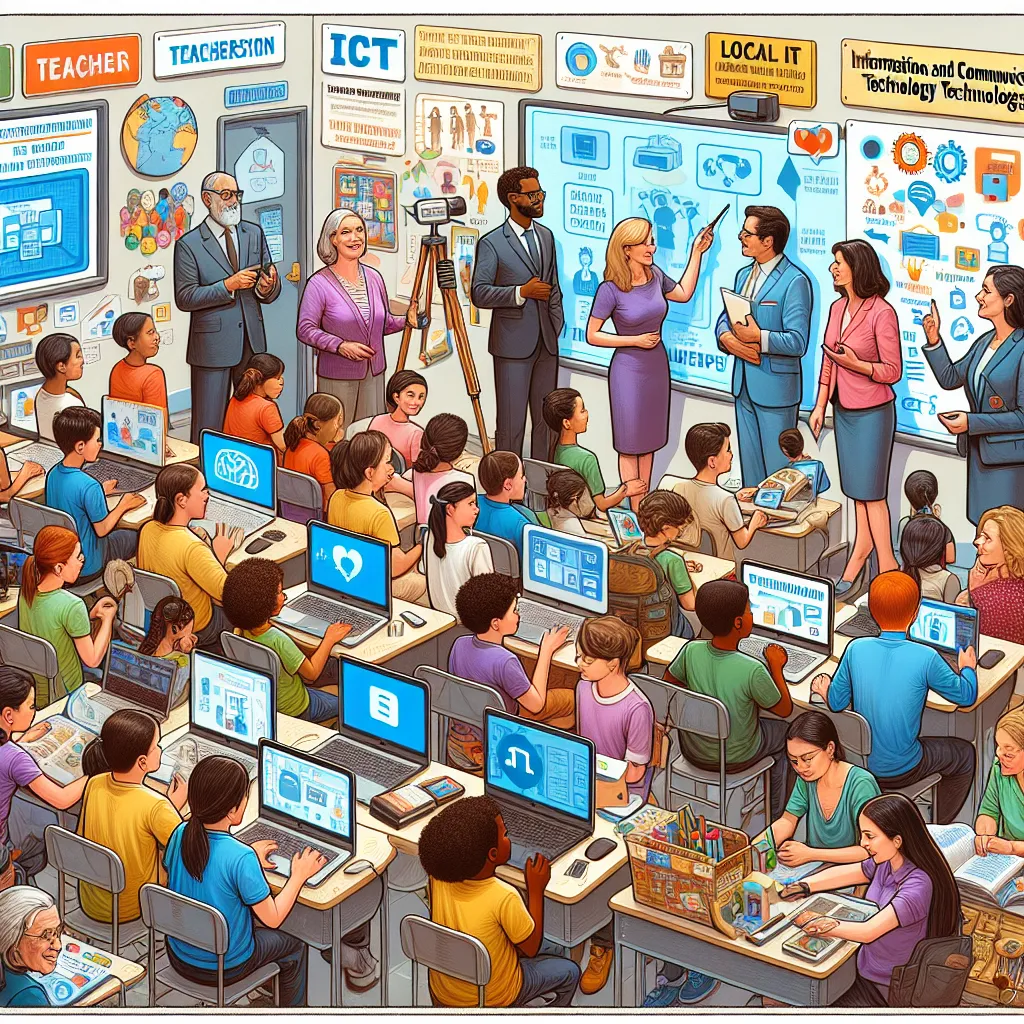Ask AI on The Internet
Question: Discuss the importance of continuous professional development for educators concerning ICT integration. Outline specific training and support mechanisms that can empower teachers to use ICTs effectively
### Importance of Continuous Professional Development for Educators in ICT Integration: 1. **Keeping Up with Technological Advances**: - Technology evolves rapidly; continuous professional development (CPD) ensures educators are proficient with the latest tools and methodologies. 2. **Enhancing Teaching and Learning**: - Effective use of Information and Communication Technologies (ICT) can transform the learning experience, making it more engaging and interactive. - Helps in incorporating diverse teaching techniques that cater to different learning styles and needs. 3. **Improving Student Outcomes**: - Students often engage better with multimedia and interactive content. Educators proficient in ICT can present subject matter in more appealing ways, potentially improving understanding and retention. 4. **Developing Digital Literacy Skills**: - Digital literacy is a critical 21st-century skill. Teachers need to model and impart these skills to students, preparing them for a technology-driven world. 5. **Facilitating Administrative Efficiency**: - Proficiency with ICT enables educators to streamline administrative tasks, such as grading, attendance, and communication, allowing for more focus on teaching. 6. **Promoting Lifelong Learning**: - Continuous learning is a hallmark of good teaching. Educators who engage in CPD demonstrate a commitment to lifelong learning, a quality they instill in their students. ### Specific Training and Support Mechanisms: 1. **Workshops and Seminars**: - Regular, hands-on workshops and seminars focused on various ICT tools and applications can provide practical knowledge and skills. - Topics could include using educational software, managing virtual classrooms, or incorporating multimedia into lessons. 2. **Online Courses and Webinars**: - Flexible online courses and webinars allow teachers to learn at their own pace. Platforms like Coursera, edX, and Khan Academy offer courses specifically tailored for educators. 3. **Mentorship and Coaching**: - Pairing less experienced teachers with tech-savvy mentors within the school can provide ongoing support and encouragement. - Coaches or knowledgeable peers can offer personalized advice and feedback. 4. **Professional Learning Communities (PLCs)**: - Creating PLCs allows educators to share experiences, challenges, and solutions related to ICT use. - These communities can be virtual or meet in person, fostering collaboration and continuous learning. 5. **In-School ICT Coordinators**: - Designating ICT coordinators within schools who can provide immediate assistance and guidance can be incredibly beneficial. - These coordinators ensure that support is readily available when technical challenges arise. 6. **Access to Digital Resources and Toolkits**: - Providing access to a repository of resources, tutorials, and toolkits that teachers can refer to as needed. - This could include lesson plans, how-to guides, and curated lists of useful educational technologies. 7. **Time Allocation for CPD**: - Allocating regular, dedicated time within the school schedule for teachers to engage in professional development activities. - Recognizing that CPD is part of their professional responsibilities and valuing it accordingly. 8. **Feedback Mechanisms**: - Establishing systems for receiving feedback from teachers on the effectiveness of ICT integration and their CPD needs. - Using this feedback to tailor future training and support initiatives. 9. **Encouraging Experimentation and Innovation**: - Creating a school culture that encourages teachers to experiment with new technologies and teaching methods without the fear of failure. - Recognizing and celebrating innovative practices and successes. 10. **Collaboration with External Experts**: - Partnering with universities, tech companies, and other organizations to provide cutting-edge training and access to new developments in educational technology. ### Conclusion: Continuous professional development in ICT integration is crucial for educators to enhance their teaching practices, improve student outcomes, and stay current with technological advancements. By implementing a variety of training and support mechanisms, schools can empower teachers to effectively leverage ICT for enriched learning experiences. This holistic approach not only benefits the teachers in their professional growth but also prepares students for a technologically advanced future.
Think your answer is better than the AI's? Post it below.
Other Most Relevant Posts:
 Integrating Melody and Mastery: Enhancing ICT Skills in Education through Continuous Professional Development
Integrating Melody and Mastery: Enhancing ICT Skills in Education through Continuous Professional Development
 1. Enhancing Educators Through Continuous ICT Development
2. Partnerships Enhancing ICT Support in South African Schools
3. Successful ICT Implementation in South African Schools
4. Steps to Enha
1. Enhancing Educators Through Continuous ICT Development
2. Partnerships Enhancing ICT Support in South African Schools
3. Successful ICT Implementation in South African Schools
4. Steps to Enha
Question Tags
If you want your question answered by an AI, click here.





Post your own comment: